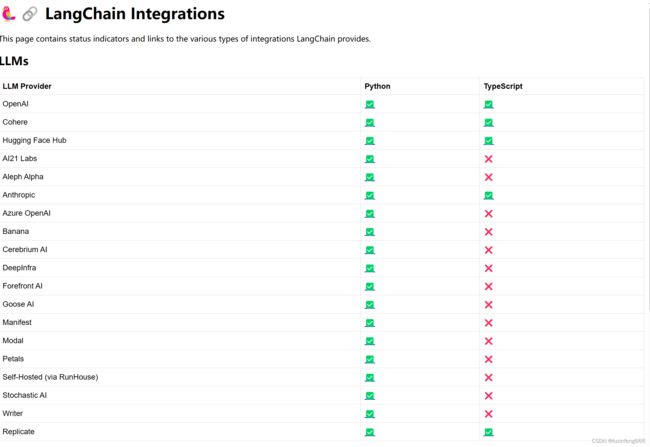langchain简版教程附案例
简介
LangChain是一个开源的应用开发框架。基于该开源框架,我们可以把大模型与各种工具结合从而实现各种功能,比如基本文档的问答,解析网页内容、查询表格数据等。目前支持Python和TypeScript两种编程语言。当前Python框架支持的模型和功能最全面。
Modules
按照官方wiki的描述,可以将Langchain的支持的功能划分为以下几个模块。
Models
该模块主要是集成了多个模型。主要分为三类:
Large Language Models (LLMs)
Large Language Models是指使用深度学习技术训练的大规模语言模型,例如GPT-3、BERT、XLNet等。这些模型具有超过数十亿个参数,可以通过学习大量的文本数据,自动学习自然语言的语法、语义和上下文等知识。这些模型可以用于各种自然语言处理任务,例如文本生成、文本分类、问答系统等。由于这些模型的规模和能力越来越大,它们在自然语言处理领域引起了广泛的关注和应用,同时也带来了一些挑战,例如模型的计算和存储成本、模型的可解释性等问题。这些模型可以作为最近特别火的问答模型的基座。
截至当前,langchain共提供了以下模型的接口。
Integrations — LangChain 0.0.176
Chat Models
即问答模型,如chatGPT3.5等,这些可以理解为大语言模型的一种应用。
截至当前,langchain共提供了以下问答模型的接口。
Integrations — LangChain 0.0.178
Text Embedding Models
该类模型的作用主要是将单词、短语或文本转换成连续向量空间。转换为向量空间后,我们即可对这些单词、短语或者文本在数学上进行比较和计算。这种比较和计算在自然语言处理和机器学习中经常被用于各种任务,例如文本分类、语义搜索、词语相似性计算等。
Text Embedding Models — LangChain 0.0.176
Pompts
第二个模块就是我们熟知的Prompt提示。
langchain本身提供了多种Prompt模板,比如ChatPromptTemplate模板,但是无论使用哪种模板,最终都是将拼接好的一段文字送入大语言模型。举个例子
template="You are a helpful assistant that translates {input_language} to {output_language}."
system_message_prompt = SystemMessagePromptTemplate.from_template(template)
human_template="{text}"
human_message_prompt = HumanMessagePromptTemplate.from_template(human_template)
部分源码如下
class SystemMessagePromptTemplate(BaseStringMessagePromptTemplate):
def format(self, **kwargs: Any) -> BaseMessage:
text = self.prompt.format(**kwargs)
return SystemMessage(content=text, additional_kwargs=self.additional_kwargs)
其实际作用类似于Java中的String.format()
Memory
默认情况下,各类大模型都是无状态的,即没有上下文的概念。如果我们想在对话模型中实现上下文关联功能,就需要对聊天记录进行保存,然后每次请求时将之前的聊天内容传递给对话模型。langchain的Memory模块就是为了便于保存历史记录而设计的。langchain提供了多种保存方式,比如内存、向量数据库等。以下举了一个例子来说明Memory模块的方便性。
from langchain.llms import OpenAI
from langchain.chains import ConversationChain
llm = OpenAI(temperature=0)
conversation = ConversationChain(
llm=llm,
verbose=True,
memory=ConversationBufferMemory()
)
conversation.predict(input="Hi there!")
如果要自己实现这部分的话,就需要考虑如何设计存储历史记录,会更麻烦些。
Indexes
索引是指文本文档的一种存储方式,正常的文本文件无法直接与语言模型进行交互,因此我们需要做一下转换。在langchain中,转换的功能就是由Indexes这个模块实现的。
Indexes模块又可继续细分,细分为Document Loaders(文件加载)、Text Splitters(文本切分)、VectorStores(向量存储)、Retrievers(检索)四部分。
在向量存储部分,langchain支持 ElasticSearch、• Redis以及• Tair等我们较为熟悉的数据库(需要IP直连)
当我们需要提取数据时,就可以使用langchain提供的Retrievers模块去进行数据提取。Retrievers模块支持多种与信息检索相关的算法,比如• TF-IDF、• ElasticSearch BM25等,也支持我们常见的额机器学习算法如• kNN、• SVM。
Chains
我们可以把一个任务理解为一个chain,langchain支持我们自定义拼装chain,组成一条任务链,也就是chains。
Agents
Agents我们可以理解为代理人,我们可以理解这个模块可以帮助我们将任务分解,即可以根据用户输入的不同产生不同的任务链(chains),以下是一个官方案例。
from langchain.chat_models import ChatOpenAI
from langchain.agents import load_tools, initialize_agent, AgentType
llm = ChatOpenAI(temperature=0.0)
tools = load_tools(
["arxiv"],
)
agent_chain = initialize_agent(
tools,
llm,
agent=AgentType.ZERO_SHOT_REACT_DESCRIPTION,
verbose=True,
)
agent_chain.run(
"What's the paper 1605.08386 about?",
)
输出为:
> Entering new AgentExecutor chain...
I need to use Arxiv to search for the paper.
Action: Arxiv
Action Input: "1605.08386"
Observation: Published: 2016-05-26
Title: Heat-bath random walks with Markov bases
Authors: Caprice Stanley, Tobias Windisch
Summary: Graphs on lattice points are studied whose edges come from a finite set of
allowed moves of arbitrary length. We show that the diameter of these graphs on
fibers of a fixed integer matrix can be bounded from above by a constant. We
then study the mixing behaviour of heat-bath random walks on these graphs. We
also state explicit conditions on the set of moves so that the heat-bath random
walk, a generalization of the Glauber dynamics, is an expander in fixed
dimension.
Thought:The paper is about heat-bath random walks with Markov bases on graphs of lattice points.
Final Answer: The paper 1605.08386 is about heat-bath random walks with Markov bases on graphs of lattice points.
> Finished chain.
快速上手
安装Python环境
- 安装Anaconda https://www.anaconda.com/download
- 安装jupyter notebook https://zhuanlan.zhihu.com/p/33105153
- 安装langchain pip install langchain.如果pip安装比较慢,可以参考https://www.runoob.com/w3cnote/pip-cn-mirror.html使用国内的镜像源,推荐清华源。
具体案例-实现一个基于本地文本的问答机器人
该案例是在Jupyter Notebook上开发完成的。
安装相关依赖
pip install openai # 安装openai依赖库,需调用openai的模型
pip install faiss-cpu
pip install tiktoken
import os
from langchain.document_loaders import PyPDFLoader #加载PDF文件需要的工具类
from langchain.vectorstores import FAISS # 开源向量库
from langchain.embeddings.openai import OpenAIEmbeddings #分词模型
from langchain.prompts import PromptTemplate #langchain提供的prompt工具
os.environ["OPENAI_API_KEY"] = "**********"
# 提取文本文件并存入向量库
loader = PyPDFLoader("/home/ubuntu/langchain/美团简要介绍.pdf")
pages = loader.load_and_split()
faiss_index = FAISS.from_documents(pages, OpenAIEmbeddings())
template = """answer the question base on {history} and {content}"""
prompt_template = PromptTemplate.from_template(template)
def answer_with_content(question):
docs = faiss_index.similarity_search(question,k=2)
result = openai.ChatCompletion.create(
model="gpt-3.5-turbo",
messages=[
{"role": "system", "content": prompt_template.format(content=docs, history='')},
{"role":"user", "content":question}
],
temperature=0.2
)
print(result['choices'][0]['message']['content'])
测试输出
answer_with_content("美团什么时候收购的钱袋宝")
# 美团收购钱袋宝是在2016年9月份。
answer_with_content("今天的天气如何")
# 抱歉,我无法回答这个问题,因为我是一个语言模型,没有实时获取天气信息的能力。建议您查看天气预报或者问问当地的气象部门。
answer_with_content("OPENAI是什么公司")
# OpenAI是一家人工智能研究公司,成立于2015年,总部位于美国加利福尼亚州旧金山。该公司的目标是推动人工智能技术的发展,同时确保其对人类的利益和安全不会造成威胁。OpenAI的创始人包括伊隆·马斯克、萨姆·阿尔特曼、格雷戈里·科赫、伊莉莎白·霍姆斯和约翰·赫维兹。该公司的研究重点包括自然语言处理、计算机视觉、强化学习等领域。
